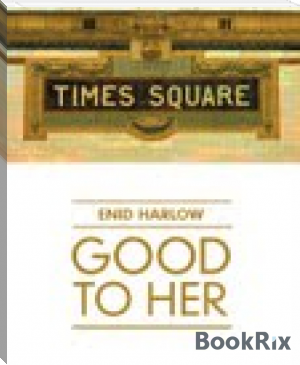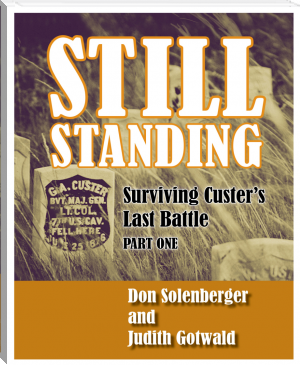Good To Her - Enid Harlow (little readers txt) 📗

- Author: Enid Harlow
Book online «Good To Her - Enid Harlow (little readers txt) 📗». Author Enid Harlow
Good to Her
Enid Harlow
Chapter One
It was Saturday, June 27, 1964. Nate sat alone at his table in Dinty Moore’s, off to the left as you come in, past the bar, and toward the rear of the room. It is his usual table, round and extra large, according to the proprietor’s decree. “A table’s gotta be big enough for a man to spread out his paper and far enough from any other for him to stretch his legs.” That was James Moore’s word on tables. But tonight the table seemed larger to Nate than usual. Perhaps it was the uninterrupted span of the linen tablecloth, so white and heavily starched, stretching across its rounded surface that made it seem so large. Perhaps it was the mirrors on the walls or the standing mirrored pillars positioned about the room that picked up the reflection of the table and threw it back into his face. Perhaps it was that he was alone. But he had often sat at this table, surrounded by mirrors, alone.
It was just past eight-thirty in the evening, Nate’s confirmed time for dinner at Dinty Moore’s. The room was nearly empty with only a few patrons sitting about, lingering over coffee and dessert. Those on the way to the theatre had already rushed off to make their curtains. Those who would drop in for a late supper or after-theatre drink were still hours away. In the lull, the place was his. Celebrated bright lights above, scrupulously scrubbed white tiles below, meticulously polished mirrors everywhere. Behind, the open kitchen in the rear, the line of tall white hats tilting as the chefs stir their big brass pots. White-coated waiters scurry about, clearing and re-setting tables for the next round of diners, yanking and replacing tablecloths with practiced hands. All across the room fresh white cloths are unfurled like sails and let to billow in the air a moment before being brought down again and resettled snugly across their tabletops. Creases are smoothed, clean plates brought, fresh cutlery and glassware. And on each table, the requisite basket of rye bread, the cabbage salad, the beets. I just don’t like them, Nate.
His Dewar’s and water sits by his right hand. The department store bill is in his inside jacket pocket. His newspapers lie in a pile at his left elbow. Tonight, the New York World-Telegram and Sun is on top. From where he sits, facing the beveled-edged glass front doors, Nate can see straight across the floor and out through the glass to the traffic passing by and the customers walking in.
“Everything all right, sir?”
“Swell, thank you, Red.”
It was the last Saturday in the month. Because she loved the sight of the late-night theatre crowds strolling in done up in their Saturday finest, Saturdays had always been the day Sallie was most likely to accompany him to Dinty Moore’s without complaint. On other days she might balk at going at all. There are other restaurants in New York, you know. She’d laugh as she said it. That laugh comes back to him now, charming and gay and bright, as he looks again toward the front doors. A radiant sound, light and alive and young as she was, he’d heard her laugh before he ever saw her face. It had swept across the room like it was seeking him out. He’d looked up, just as he looked up now, and there she was, standing at the door, surrounded by sailors.
The special on Saturday is the Irish stew. He would have that, and Sallie, the chicken fricassee.
The theatre crowds were what got Sallie into Dinty Moore’s. She came more for them than the food, and would refuse to come at all if there was a fight on he was determined to see. Honestly, Nate. How can you watch that awful stuff?
Again, he sees her eyes light up as they fasten on the Saturday crowds pouring in through the doors just after eleven, when the theatres broke. He watches her direct her gaze to the mirrors affixed to the walls (as all Dinty Moore regulars learned to do) to track a celebrity’s progress across the room. He recalls how she adored checking out the late-nighters, the men in tuxes, some of them, most in three-piece suits, such as he wore, with red or blue striped silk ties knotted high on the collars of their starched white shirts. The women in fancy gowns and furs, diamonds or what passed for them, at their wrists and throats.
Oh, look at that one. Her voice comes back to him, whispery and low. She’s too beautiful to be real.
Again, he sees her green eyes and rosebud lips, her golden-bronzed tresses swinging beneath one of those hats she always wears and he always resents for obscuring her glorious tresses. Again, he hears her high heels clicking on James’s tiles. Sallie was a stunner and always dressed to kill when they went out for an evening, so Nate never understood why, when comparing herself to the other women in the place—scrutinizing as only she could, with the critical eye of a horse breeder, their hair and makeup, the cut of their gowns, the size of the sparklers issuing from their fingers and ears—she seemed to find herself lacking.
“They don’t hold a candle,” he’d say and give her hand a squeeze whenever he heard her reach that blatantly erroneous conclusion.
Always, she’d answer with, You’re so good to me, Nate.
Tonight, he wondered.
Dinty Moore’s was his place, New York his town. The two rolled into one—his only love until Sallie came along. Just over fifty years ago tonight, his great late friend, James Moore, had opened his restaurant here at 216 West 46th Street. March 7, 1914, was the date. Long before he met Sallie, long even before he met James. Originally, his friend had set up shop under his own first and last names. ‘James Moore’s’ read the sign that would swing in a stiff breeze on the south side of 46th Street, between Broadway and Eighth. “So where did Dinty come from?” Sallie had asked when they first met. “From the comic strip, Bringing Up Father,” Nate told her, always pleased to be able to answer her questions. The strip, he explained, was written by James’s old friend the cartoonist George McManus and turned out to be an instant hit for King Features. It told the tale of an Irishman named Jiggs who wins the Irish Sweepstakes and sees no reason his sudden accumulation of wealth should mean he can’t continue hanging out with his working class pals at his favorite tavern. That tavern was run by a guy McManus dubbed Dinty Moore. “And James, being an Irishman himself,” Nate said to Sallie, “took such a liking to the character he changed the name of his joint from James Moore’s to Dinty Moore’s.” The name stuck and Dinty Moore’s became a favorite of the Broadway theatre crowd, the sporting and gambling crowds as well, although, to Nate’s consternation, his friend’s restaurant was never awarded landmark status or declared a national monument, which Nate and not a few others, Walter Winchell among them, thought it should have been.
“Walter Winchell? Really, Nate?”
“Really, sweetheart.”
Old Man Moore, as James came to be known (also the Corned Beef and Cabbage King), though Nate never called him anything but James, always made sure there was fresh rye bread on his tables as his customers sat down, along with a plate of cold sliced roasted beets and a simple chopped sweet and sour cabbage salad. There they were tonight, on every table, just where James would have placed them were he still around to do so: the rye bread in their baskets, the cabbage salad and cold sliced beets in their white porcelain plates with the thin green trims. “They get the juices running,” James would reply if asked to explain their purpose. But Sallie never took to the beets. Again, she sits beside him. He smells her perfume, hears her voice.
“I just don’t like them, Nate.”
Again, her long slender fingers come up over the rim of the table and daintily push the beets away.
“Have what you like. Price is no object.”
Again, her reply. “You’re so good to me, darling.”
Again, he wondered.
Enid Harlow is the author of two other novels, Crashing (St. Martin’s Press, New York), and A Better Man (Van Neste Books, Midlothian, Virginia). Her short stories have appeared in numerous literary journals of national distinction. She has received two PEN Syndicated Fiction Awards and a fellowship in fiction from the New York Foundation for the Arts. The author earned both her B.A. and M.A. degrees from New York University. She lives in New York, the city of her birth.
Learn more at www.enidharlow.com.
Imprint
Publication Date: 09-27-2013
All Rights Reserved





Comments (0)